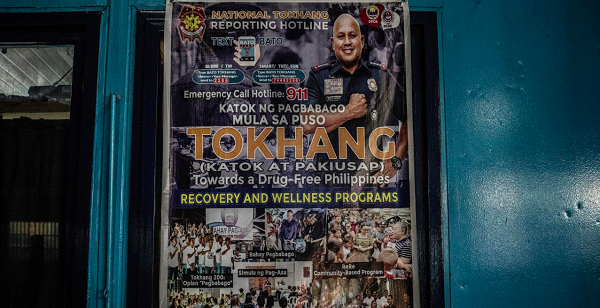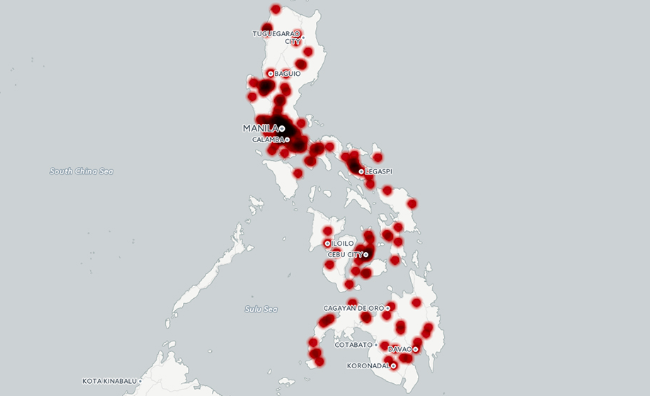CHR Warns Duterte Against Drug War
December 13, 2018 | Expert Insights

Philippines' Commission on Human Rights has urged the government to follow 'due process' with suspects instead of shooting them, saying that Duterte's war on drugs will become a 'killing field' if it continues.
Background
During his presidential campaign, Rodrigo Duterte claimed that drug dealing and drug addiction were major obstacles to the Philippines’ economic and social progress. He promised a large-scale crackdown on dealers and addicts, similar to the crackdown that he engaged in when he was mayor of Davao, one of the Philippines’ largest cities on the southern island of Mindanao.
Since becoming president of the Philippines in June 2016, he encouraged the public to “go ahead and kill” drug addicts. His rhetoric has been widely understood as an endorsement of extrajudicial killings, as it has created conditions for people to feel that it’s appropriate to kill drug users and dealers. The president’s war on drugs has resulted in the extrajudicial deaths of thousands of alleged drug dealers and users across the country in vigilante attacks against alleged or suspected drug dealers and drug addicts. The police are engaged in large-scale sweeps. The Philippine National Police also revealed a list of high-level political officials and other influential people who were allegedly involved in the drug trade.
The dominant drug in the Philippines is a variant of methamphetamine called shabu. According to a 2012 United Nations report, among all the countries in East Asia, the Philippines had the highest rate of methamphetamine abuse. Estimates showed that about 2.2 per cent of Filipinos between the ages of sixteen and sixty-four were using methamphetamines - and that methamphetamines and marijuana were the primary drugs of choice. In 2015, the national drug enforcement agency reported that one-fifth of the barangays, the smallest administrative division in the Philippines, had evidence of drug use, drug trafficking, or drug manufacturing; in Manila, the capital, 92 per cent of the barangays had yielded such evidence.
The drug war is a cornerstone of Duterte’s domestic policy. In December 2016, the United States withheld poverty aid to the Philippines after declaring concern over Duterte’s war on drugs.

Analysis
Rodrigo Duterte's war on drugs will lead to a "killing field" if the Philippines president is allowed to continue his crackdown, the country's Commission on Human Rights (CHR) has warned.
While officials have put the death figure close to 5,000 since Duterte came to office in 2016, rights groups and opposition politicians say more than 20,000 people have been killed by police. In the first year alone, 54 children were killed. When the president came into power, he said this crackdown would be over in six months. Later, he said it will continue throughout his term.
One particularly affected province is Cebu, where residents remain worried as the drug-related killings continue and police say they will be relentless in trying to achieve the president's mission. "The police have to fight back. There will be collateral damage and even the innocent people will be victims," said Royina Garma, Cebu city police director.
Earlier this year, the International Criminal Court (ICC) launched an investigation into Duterte's war on drugs, opening a "preliminary examination" into the deaths to determine if the gravity of the crimes fall under its jurisdiction. Duterte immediately announced his country's withdrawal from The Hague-based court, saying it "has no jurisdiction nor will it acquire jurisdiction" over him.
The CHR is demanding authorities undertake "due process" when dealing with the suspects instead of shooting them dead. "The suspects should be arrested and taken through a legal process and not killed," said Gwendolyn Pimentel-Gana, commissioner of the CHR. Duterte’s war on drugs has left thousands of children living as orphans or in single-parent families struggling to put food on the table.
Counterpoint
In September 2018, Duterte appeared to take responsibility for the killings, saying "my only sin is extrajudicial killings”. The president’s approval rating, currently at its lowest since he took office, stands at 75%.
Assessment
Our assessment is that there needs to be a paradigm shift on the government's part and that it needs to change its perspective on this war on drugs. We believe that international pressure could yet have an impact on the violation of justice and human rights in the Philippines and that it must be exerted.
India Watch
President Rodrigo Duterte discussed the Philippines’ war on drugs with Indian Prime Minister Narendra Modi on early in 2018 in New Delhi and the latter agreed that the drug menace is a serious international concern. Modi acknowledged the problems brought by the illegal drug trade to any society and said: “there might be a need for international cooperation to deal with the menace.” The Prime Minister highlighted that it should be of the same scale and scope as the international cooperation that we have today on climate change. The problem of illegal drugs is one of the issues being addressed by the Association of Southeast Asian Nations. The regional bloc has crafted a work plan on securing communities against illicit drugs to coordinate strategies to achieve a drug-free ASEAN.








Comments